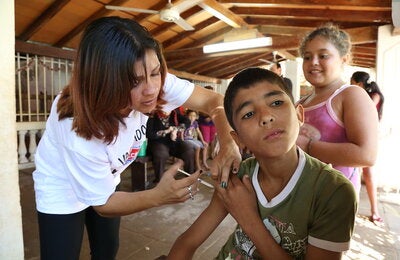Washington, January 27, 2009 (PAHO)—The recently announced change in United States policy on foreign aid funding for women's health programs abroad presents "an opportunity to expand services that can save the lives and protect the health of millions of women in Latin America and the Caribbean," said Dr. Mirta Roses Periago, Director of the Pan American Health Organization (PAHO).
Roses responded to the Obama administration's announcement last Friday that it would lift restrictions on foreign aid funding for groups that provide family planning services for women in developing countries. The rescinded restrictions are contained in the Mexico City Policy, widely known as the "Global Gag Rule." They prevented organizations from receiving U.S. assistance if they also provided services related to abortion, including counseling and referrals, even in countries where these services are legal.
As the Regional Office of the World Health Organization, PAHO promotes the achievement of "health for all," which includes the respect of reproductive and sexual rights, and the provision of related health services.
Under the Mexico City Policy, organizations that provided any of the proscribed services were unable to receive U.S. funds for contraceptive supplies, such as female and male condoms, birth control pills, intrauterine devices, and other medically effective methods of contraception.
"Restrictive policies halt the development of comprehensive family planning and other sexual health services," said Marijke Velzeboer-Salcedo, coordinator of PAHO's Gender, Ethnicity and Health Team. "We need programs that help women and men enjoy a satisfying sex life and decide the timing and spacing of children. These programs should also educate them about the correct use of condoms, the best technology currently available to prevent HIV."
In Latin America and the Caribbean, unplanned and unwanted pregnancies; complications during pregnancy, delivery and postpartum; and unsafe abortions still claim the lives and harm the health of many women. "Just one maternal death in one year is a tragic event; 23,000 maternal deaths is shameful," said Dr. Roses. "The vast majority of women who die in Latin America and the Caribbean die from causes that are preventable and that are routinely prevented in developed countries."
"The new U.S. policy generates an excellent opportunity to better coordinate prevention strategies for the whole American continent," said Dr. Roses. Last August, 30 ministers of health and 25 ministers of education from Latin America and the Caribbean met in Mexico City to commit to scaling-up programs for sexual health and sexual education. "PAHO is committed to facilitating the development of a common approach to these issues among its member countries," said Dr. Roses.



